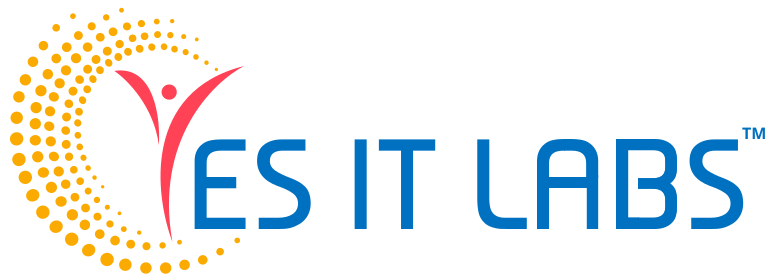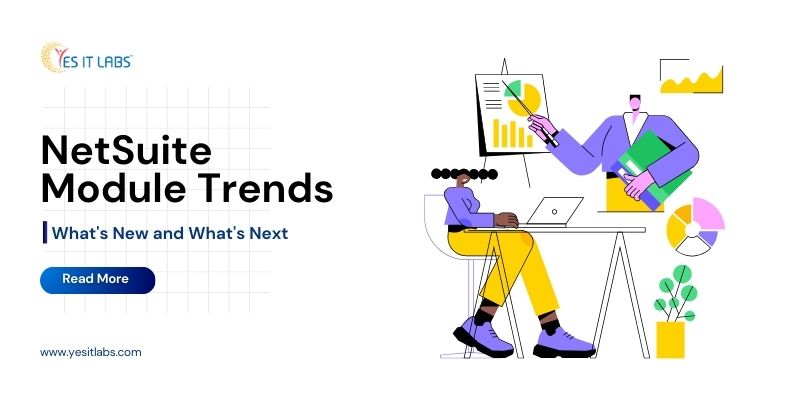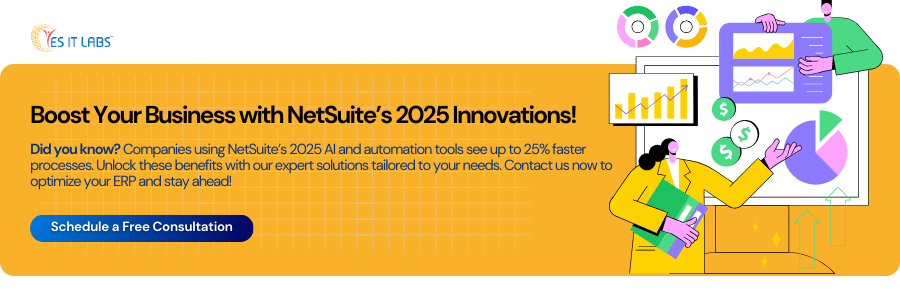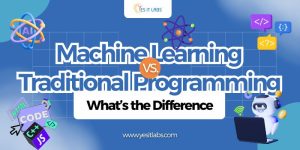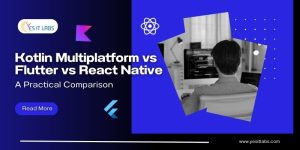NetSuite, Oracle’s leading cloud ERP platform, empowers businesses to streamline operations with its modular design. From financial management to supply chain solutions, NetSuite module trends in 2025 focus on AI, automation, and seamless integrations. This article explores the latest updates, their benefits, and future directions for NetSuite users, administrators, and decision-makers. Discover what’s new, how it solves business challenges, and what’s next.
Why NetSuite Module Trends Matter
Businesses rely on NetSuite for flexibility and scalability. The 2025 updates address key needs: real-time insights, reduced manual tasks, and industry-specific solutions. By leveraging AI, automation, and enhanced connectivity, NetSuite helps users save time, improve accuracy, and scale efficiently. Whether you’re in finance, e-commerce, or manufacturing, these trends drive smarter decisions. For tailored implementations, partnering with an IT consulting company can ensure seamless adoption.
Key Trends Shaping NetSuite Modules in 2025
NetSuite’s evolution aligns with ERP demands for efficiency and innovation. Here are the top trends shaping its modules:
- AI and Machine Learning: AI powers predictive analytics, anomaly detection, and natural language processing. Users can forecast trends and automate tasks without technical expertise.
- Automation: Streamlined workflows in finance, supply chain, and HR reduce errors and speed up processes.
- Industry-Specific Features: Tailored tools for healthcare, SaaS, D2C brands, and project-based firms include compliance and dashboards.
- Third-Party Integrations: New APIs connect NetSuite with Shopify, Salesforce, and Square for seamless data flow.
- Improved User Experience: Intuitive interfaces, mobile access, and role-based dashboards boost adoption.
- Compliance and Security: Enhanced audit logs, e-invoicing, and encryption meet global regulations.
These trends answer common questions: How does NetSuite save time? How does it scale? Let’s explore the 2025 releases.
What’s New in NetSuite 2025 Releases
NetSuite delivers two annual releases, bringing automatic updates with minimal disruption. The 2025.1 release focused on usability, while 2025.2 emphasizes AI and efficiency. For businesses needing customized solutions, NetSuite development services can adapt these updates to specific workflows. Here’s what’s new.
NetSuite 2025.1 Updates
This release improved user experience and core functionality.
- Faster Interface: Cleaner layouts, collapsible menus, and advanced global search. Role-based dashboards show real-time alerts, like cash flow for finance teams.
- Enhanced Analytics: A search builder lets non-technical users create custom reports. Real-time dashboards cover billing, HR, and inventory.
- Platform Upgrades: Faster REST APIs, improved sandbox syncing, and better tracking for custom scripts.
NetSuite 2025.2 Updates
This release builds on 2025.1 with AI-driven tools and operational improvements.
- AI Advancements: Contextual Insights in Analytics Warehouse auto-compare data. Multivariate forecasting in Planning and Budgeting uses machine learning.
- Supply Chain Tools: Planning Workbench reschedules orders. SuiteAnalytics integrates planning data for ad-hoc reports.
- Finance Automation: Bulk bank reconciliations, direct revenue posting, and a SaaS Metrics Dashboard track recurring revenue.
- Additional Features: Support for three user sessions, unified Customer 360 tabs, and a shift to NetSuite2.com data source by 2026.1.
| Feature | 2025.1 Focus | 2025.2 Focus |
| UI/UX | Faster loading, role-based dashboards | Redwood theme, multilingual Text Enhance |
| AI/Analytics | AI forecasting, search builder | Contextual Insights, Job Analytics |
| Finance | Bank sync automation | Bulk reconciliation, SaaS metrics |
| Supply Chain | – | Planning filters, bin blocking |
| Integration | E-commerce APIs | Square, Avalara e-invoicing connectors |
These updates address slow processes and data silos, with instant access post-upgrade.
Deep Dive into Module-Specific Updates
NetSuite’s interconnected modules offer targeted enhancements. Here’s how they benefit users.
Finance Module
Finance updates speed up closes and ensure accuracy.
- AI Forecasting: Predicts cash flows, revenues, and expenses with anomaly detection.
- Bank Reconciliation: Bulk transaction actions and GL controls accelerate month-ends.
- Revenue Management: Direct workflow posting and field mapping simplify processes.
- SaaS Metrics: A dashboard tracks churn and lifetime value, linked to SuiteAnalytics.
- E-Invoicing: US DBNA and Avalara SuiteApp reduce B2B admin costs.
Tip: SaaS users can enable the Metrics Dashboard for 20-30% faster revenue reporting.
Supply Chain and Inventory Management
New tools enhance visibility and control.
- MRP Updates: Planning Workbench suggests order changes with subsidiary filters.
- Warehouse Management: Auto-generated serial numbers and bin blocking with Smart Count.
- Ship Central: Carrier pickup scheduling and return label generation.
- Inventory Imports: CSV support for bin putaway data.
- Analytics: SuiteAnalytics forecasts supply and demand.
D2C brands benefit from faster fulfillment and fewer stockouts. Pair with AI for predictive inventory.
Manufacturing Module
Targeted updates improve precision.
- Lot/Serial Tracking: Mobile apps enable real-time visibility.
- WIP Costing: Dashboards for capacity planning and production.
- Auto Numbering: Built into WMS for seamless builds.
These support scalable manufacturing without custom code. A custom software development service can further tailor these features to complex production needs.
HR and SuitePeople Module
Mobile and AI features streamline talent management.
- Self-Service Portal: Mobile access for time-off, pay stubs, and updates.
- Talent Tools: Workflows for reviews and promotions.
- Compliance: Supports 457(b) contributions and Secure Act 2.0 reporting.
- Text Enhance: AI generates job descriptions.
These cut HR admin by up to 40%, ideal for remote teams.
Analytics and AI Modules
AI drives smarter insights.
- Analytics Warehouse: Auto-generates data comparisons.
- Planning and Budgeting: Machine learning for multivariate forecasts.
- Close Management: Job Analytics summarizes logs.
- Compliance 360: AI audit summaries and recommendations.
- NetSuite Expert: Natural language search in SuiteAnswers.
Pro Tip: Customize Text Enhance for 22 languages to support global teams.
Ecommerce and SuiteCommerce Module
Connectivity powers online sales.
- Faster Checkouts: Abandoned cart emails and headless commerce APIs.
- Integrations: Sync with Instagram/TikTok Shops, Shopify B2B, and Salesforce.
- Square Connector: Auto-syncs POS data.
These simplify omnichannel e-commerce.
What’s Next for NetSuite Modules
NetSuite’s roadmap includes deeper AI, sustainability tracking, and industry solutions. The SuiteWorld conference (October 2025, Las Vegas) may preview 2026 features like GenAI for manufacturing and enhanced EPM for budgeting. Expect more automation, quantum-resistant security, and IoT integrations for inventory.
Action Step: Review release notes and test updates in sandboxes. Upgrading to 2025 can yield 15-25% efficiency gains.
Conclusion:
NetSuite’s 2025 module trends make it a top choice for agile businesses. AI insights, automated workflows, and robust integrations address user needs for speed, accuracy, and scalability. Explore these updates in your account or consult a NetSuite partner. Ready to upgrade? Stay ahead with NetSuite’s smarter ERP solutions.
